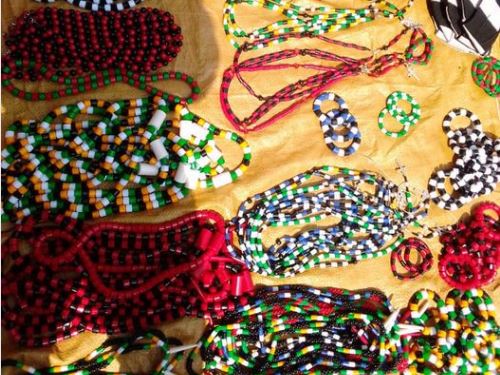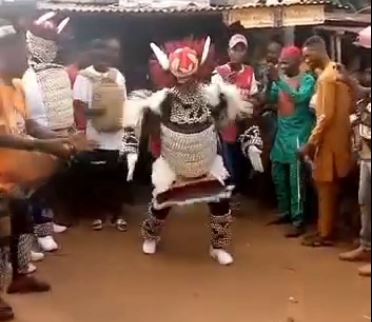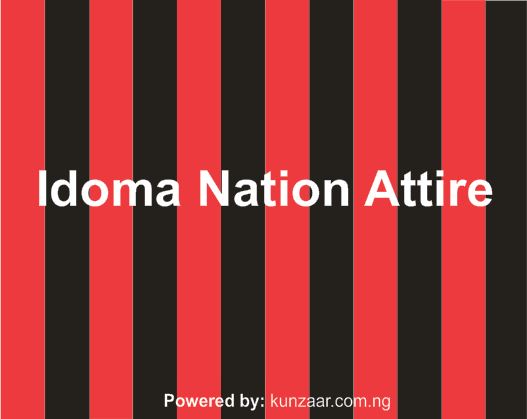Introduction
The Idoma people are said to be the second largest ethnic group in Benue state North-central Nigeria occupying nine Local Governments in the state. They are also found in some part of Nasarawa and Cross River States Nigeria. Many Idoma’s sons and daughters claimed Apa as their ancestral home. History had it that Apa was part of the ancient historian Kingdom of Kwararafa during the Sudanic empire. Idoma journey began between 1535 and 1805 before settling down in the present day Otukpo. They are found between the Benue River and the northern fringes of Igboland.
In Idoma language, there are many dialect that are ascribed as Idoma, such as: the Agala, Iyala, Okpoto, Nkum, and Iguwale, are classified as speakers of distinguishable Idoma dialects, which were described as the tribe that belong to the Kwa or Kwararafa branch of the Niger-Congo or Sudanic empire family of languages. Other Idoma groups of Kwararafa origin are Ugbooju, Adoka, Oglewu, Orokam, Agatu Igumale, Agila and Otukpa all these people are called the Idomas.
Idoma traditional ruler is called “Och’Idoma” and is resident at Otukpo Palace the country home of Idoma. Before the coming of Christianity to their land, the Idomas has their belief and that’s ‘Alekwu’. Alekwu served as the gods of the Idoma people. It is the spirit of the ancestors of the Idoma people. Anytime they needed clarification on an issue, they would consult the Alekwu which they strongly believed its existence was as a result of the dead ancestors with a specific functions. In short, Alekwu is spirit of dead ancestors with a specific functions.
Also Read: Tarok Language: Where Did Tarok In Nigeria Migrate From?
The Alekwu poetry is a national warehouse from which the Idoma society looks at itself and believed that it is capable of reconstructing its past for group identification and solidarity among the Idomas. But with the coming of Christianity, many have abandoned such practices as it is written in the Holy Bible, “You cannot serve God and Mammon.” You have to choose one and abandon the other. Those that have already chosen Christ, has since abandoned the Alekwu believe though still many consult Alekwu.
Idoma Attire (Red and Black)
Like other tribes in Nigeria and other parts of the world, some people were asking question and wondering as what is the rationale behind the colours on the Idoma’s attire. When we contacted some elders of the land they traced the origin of the fabric to over thirty years ago when the then Idoma Traditional Council under the leadership of Okpabi approved the red and black as the official dressing colour of unity and identification for the tribe. According to them, the red stands for the strength of the people and also as a symbol that no power or might of another empire can take away the Idoma from their present settlement while they postulated that the black referred to the agrarian nature of the people who interact with the earth for many other purposes. “For us as Idoma people, the land holds a lot of power and that is why we celebrate ‘Ej’ Ajaje’ -a ceremony to appease the land. We also place emphasis on ‘Oka’-royal bead and ‘Okwute’ which means the royal scepter,” they narrated.

Festival
Like most African, Idoma nation are not left out for setting out a period of time (at least three times of different festival) in a year to celebrate their cultural heritage among which is a period of three days every year to celebrate the spirits for a bountiful harvest in the out-going year, and the expectation for the beginning of the New Year’s planting season to be good also.
There are many festival in Idoma but the top are at least four (4), they are:
- Eje Alekwu Ugboju
- Igede Agba Festival
- Awume Day
- Agatu Fishing Festival
The Idoma tribe in Benue state celebrates festivals which they inherited from their ancestors’ year-in, year-out. The festivals in general terms is one of the greatest times in the life of some people. Festivity is not something that one will miss out especially culture loving people on nothing because of the glamour in it. Though many aspects of these festival seem very colorful to watch while others look horrific and fearful.
During these festivity, people staying outside the community, state or even nations have to come to pay respect to their various communities or even those people who loved to see other people’s culture converge to witness these festivals. Celebration is very important because of the integration and important issues discussed during the festival. Though, with the Coming of Christ, it has limited some festival and they mostly focus on the Christmas season to do some family meeting and discussions.
The Eje Alekwu Ugboju is the most celebrated festival in Idoma land. The colorful event is characterized by heavy rain. This celebration is usually once in a year. People travel from different parts of the country to celebrate this festival regardless of their location at that moment. Anyone missing this festival seem to that person as if he/she has missed a big thing.
Before the festival, the elders has to consults their god to choose the date for them because Alekwu is the god of jealousy in Idoma. During the festival, it is believed that all business activities are suspended. That’s the law of their land and law of the land supersedes every other law in the Idoma kingdom. Thank God for Christianity which has given us liberty to ask God for what we need without fear and to celebrate Him with joy and praise.
The purpose of the Eje Alekwu Ugboju celebration is to mark the day the god fought for the community and won the fight. It’s just an avenue to pay the god back according to the belief of the Ugboju people.
The Igede Agba Festival is celebrated to mark the new yam season. It is also to thank their ancestors and god of the land for a good farming season.
The Awume Day Festival is celebrated to mark the remembrance of the founding fathers of the community. Every year people travel from far and near to embrace this wonderful occasion that is been celebrated by Awume people.
While the Agatu Fishing Festival is celebrated by the Agatu people because they are surrounded by water. The fishing festival is one of its kind in Idoma nation. No doubt, this festival that has come to stay in Idoma land due to its popularity and the number of people that witness this festival. Every year people have to showcase their talent through fishing. A great harvest of fish is anticipated every year from the fishermen. This festival is witness by many people from outside the Idoma kingdom. In fact, people from different part of the country come to witness this festival.

Economy
The Idoma people are predominantly farmers contributing to the slogan Food Basket of the Nation given to Benue state for its vast land for agricultural and producing almost all types of foods produced by farmers. It is believed that, Benue state along can feed the entire country and even have more to feed other countries. The crops that Idoma grows are cassava, yam, guinea corn, maize, rice, soya beans, palm fruits, etc. We cannot forget the Agatu fishing festival which is part of the farming we are talking about. That means Idomas are also good in fishing as it generated revenue also to the state.
To engaged in doing business, Idomas involved in hunting especially in dry season and blacksmithing too. Within the Idoma nation, they also involved in crafts such as the weaving and dyeing of cotton cloth.
Food
As the food basket of the nation. Let him that works enjoy the labour of thy hand. Of course, as they farm, it is also good to eat some of the food produce. They enjoy eating rice, pounded yam, eba, amala, etc. Idoma have some food that they cannot do away with especially some categories of soup. They are: Okoho, jollof rice and rice fufu, Okra (both fresh and dried one), ogbono, egusi, etc. These food are served even at a wedding and funeral.
Marriage In Idoma Tribe
As in most of the Africans and other part of the world cultures, traditional marriage is an arrangement between two families rather than an arrangement between two individuals though is involved two individuals which means the two individuals cannot conclude everything about their marriage families must involve that is why is the responsibility of the two families to make arrangement for the success of the marriage. In fact, the two families must be involved to make it work. In Idoma land marriage is considered a lifelong state of union, although divorce is possible on the grounds of Infidelity but not so in the Christendom especially people practicing Christianity as marriage is for better for worst, divorce is not an option in a Christian marriage.
For an Idoma man to marry, it is advisable to attend the ripe age of about twenty-five years old and has the financial and physical capability to maintain a wife and children. The searches for a woman can be undertaken by the man himself who will find a woman of his choice, his parents or other relatives and the girl must be at least eighteen years old. He informs his family of his desire to marry and they will in turn choose Ogbo’bonya (a person who is familiar with the girl’s family). Ogbo’bonya is simply refers to as a go-between.
The Ogbo’bonya investigates the family of the prospective bride to ascertain that the family has no history of specific ailments e.g. mental disease, epilepsy, negative verses, and/or similar problems is not found in their family lineage. If the result of the Ogbo’bonya’s investigation is positive, the prospective groom’s family visits the woman’s family with gifts of kolanut and drinks to indicate their interest on her.
After both families had reached an agreement then the marriage process will kick-start while a certain amount of money would be paid to indicate that she has been taken by someone. This is called Achi’osechefu. Then both families will scheduled an acceptable date for the next meeting to discuss further on the bride price and other things but her father is not supposed to be on ground only Ogbo’bonya and some members of both families. The bride price will be call due to her academic qualification but there’s always a room for negotiation for them to reach upon.
After they have reached on the amount to be paid as bride price, the groom’s family will present the amount with them with a promise to pay in full in the offing. The Ogbo’bonya will now present the money to the groom’s parents and a kindhearted father would probably take out N300 for himself and N200 for the wife- (bride’s mum) totaling N500 (five hundred naira only) and ask the groom to use the rest to take care of his daughter and never to allow her go hungry that’s why they farm very much so that they will not stay hungry. Is that not fear enough?
The man will be given list of items as part of marriage rites though the items differ from one ethnic group to another.
Some of the items are listed below for example, in Owukpa and Ogbadibo:
- Cloths for the Father of the girl
- Cloths for the Mother of the girl
- A Suitcase for the wife to be, et al
- Some tubers of Yam
- Two basins of rice
- One or two bags of Salt depends on the family
- Two she-goats for both mum and dad
- Drinks (both alcoholic and non-alcoholic). Alcoholic drinks are not welcomed in Christian marriage. And any other things that are not Biblical are discouraged.
When it reach the turn of the bride’s mother, she buys for her daughter cooking utensils and food because she is not expected to go to the market for the first five market days after her marriage. Before the bride is handed over to her husband, her age group will be around motivating her. Also every member of the bride’s mother’s family present must be given money, with the groom’s family determining the amount and is willingly. The bride’s age group and her more distant relatives also are given money also, with the amount varying with level of the bride’s education and productivity.
The final stage is when the groom’s family gives the bride a rooster and some money. If she accepts these gifts and gives them to her mother, she indicates her acceptance of the groom and is showered with gifts and money, but if she refuses to marry the man after these gifts have been provided, the bride’s family will return everything. After everything has gone well then there will be eating and drinking, then the wife will be handed over to Ogbo’bonya as a wife to the groom.
You Can Also Read: Websites That Pays You Daily Even With Your Phones In 2024
Then the father of the bride will hand over some vital information as a warning to the Ogbo’bonya on behalf of the groom such as: We don’t kick our women, She’s not for sale, and in the event of death which is inevitable, Return her corpse whenever she dies. She must not be buried outside. This is one of the things Idoma doesn’t take it lightly. It doesn’t matter if it is to an Idoma man or an outsider. It is believed that their daughters are not sold out by their fathers and their place is always in their father’s houses and such must be returned there after death, unlike some traditions that say the wife belongs to the husband and should be buried in his compound. In some situation, the woman’s kinsmen threatened to cause serious problems if her corpse is not released to them for burial. Even more serious cases as her kinsmen will go to the extent of stealing her remains from her husband place who refused to release his wife’s corpse.
As adultery and fornication are serious sins as a Christian, however, in a case where the girl takes in (got pregnant out of wedlock) before the wedding, traditionally, both families will have to wait until the girl puts to bed before the marriage rites commence. In some parts of Idoma land, especially Owukpa, if a man impregnates any girl before marriage, there’s a fine he will have to pay before he asks for her hands in marriage.
Divorce is never an option in Christendom, in Idoma, whenever both couple agree to go their separate ways (DIVORCE) the woman is not expected to leave with anything she bought while the marriage lasted. The bride’s parents are also expected to cough out the bride price and some of the things the groom bought during the marriage ceremony for them. What’s an irony? Marriage are meant to last forever till death do them part. Hope your marriage will end in divorce, it will last for your life time.
In our own opinion, Idoma community is among the best place to marry from due to their hospitality and other things. But is left for you now who is single and searching or searching wife for someone else to marry to decide.
Hope Idoma culture is captivating and lovely? You can also visit Otukpo and other places you know Idoma are found to be able to learn and see more of their culture which we did not feature it here in our article.
We hope this article is helpful? Keep visiting our website for this and many more cultures for you to entertain yourself with.

